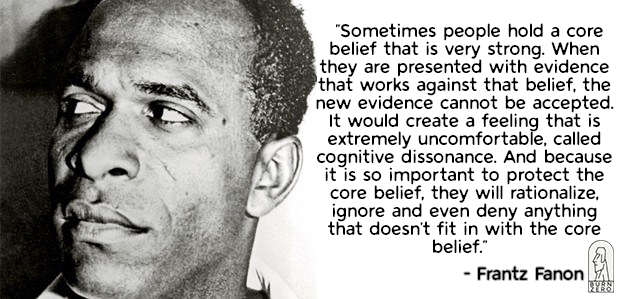Cognitive dissonance: Difference between revisions
mNo edit summary |
mNo edit summary |
||
| Line 2: | Line 2: | ||
</div> | </div> | ||
''' | '''In an ideal world, rational people who encounter new evidence that contradicts their beliefs would evaluate the facts and change their views accordingly. But that’s generally not how things go in the real world.''' | ||
Partly to blame is a cognitive dissonance which is a physically felt pain that can kick in when people encounter evidence that runs counter to their beliefs. Instead of reevaluating what they’ve believed up until now, people tend to reject the incompatible evidence. Psychologists call this phenomenon belief perseverance. Everyone can fall prey to this ingrained way of thinking. | |||
Being presented with facts — whether via the news, social media, or one-on-one conversations — that suggest their current beliefs are wrong causes people to feel threatened. This reaction is particularly strong when the beliefs in question are aligned with your political and personal identities. It can feel like an attack on you if one of your strongly held beliefs is challenged. | |||
Confronting facts that don’t line up with your worldview may trigger a “backfire effect,”<ref>'''Exposure to opposing views on social media can increase political polarization'''. Christopher A. Bail Edited by Peter S. Bearman, Columbia University, New York, NY, and approved August 9, 2018. Accessed on 31st August 2022 via <nowiki>https://doi.org/10.1073/pnas.1804840115</nowiki></ref> which can end up strengthening your original position and beliefs, particularly with politically charged issues. Researchers have identified this phenomenon in a number of studies, including ones about opinions toward climate change mitigation policies and attitudes toward childhood vaccinations. | |||
This gets worse with age as [[neuroplasticity]] diminishes and changing our minds becomes increasingly difficult. | |||
Revision as of 22:26, 30 August 2022
In an ideal world, rational people who encounter new evidence that contradicts their beliefs would evaluate the facts and change their views accordingly. But that’s generally not how things go in the real world.
Partly to blame is a cognitive dissonance which is a physically felt pain that can kick in when people encounter evidence that runs counter to their beliefs. Instead of reevaluating what they’ve believed up until now, people tend to reject the incompatible evidence. Psychologists call this phenomenon belief perseverance. Everyone can fall prey to this ingrained way of thinking.
Being presented with facts — whether via the news, social media, or one-on-one conversations — that suggest their current beliefs are wrong causes people to feel threatened. This reaction is particularly strong when the beliefs in question are aligned with your political and personal identities. It can feel like an attack on you if one of your strongly held beliefs is challenged.
Confronting facts that don’t line up with your worldview may trigger a “backfire effect,”[1] which can end up strengthening your original position and beliefs, particularly with politically charged issues. Researchers have identified this phenomenon in a number of studies, including ones about opinions toward climate change mitigation policies and attitudes toward childhood vaccinations.
This gets worse with age as neuroplasticity diminishes and changing our minds becomes increasingly difficult.
- ↑ Exposure to opposing views on social media can increase political polarization. Christopher A. Bail Edited by Peter S. Bearman, Columbia University, New York, NY, and approved August 9, 2018. Accessed on 31st August 2022 via https://doi.org/10.1073/pnas.1804840115
